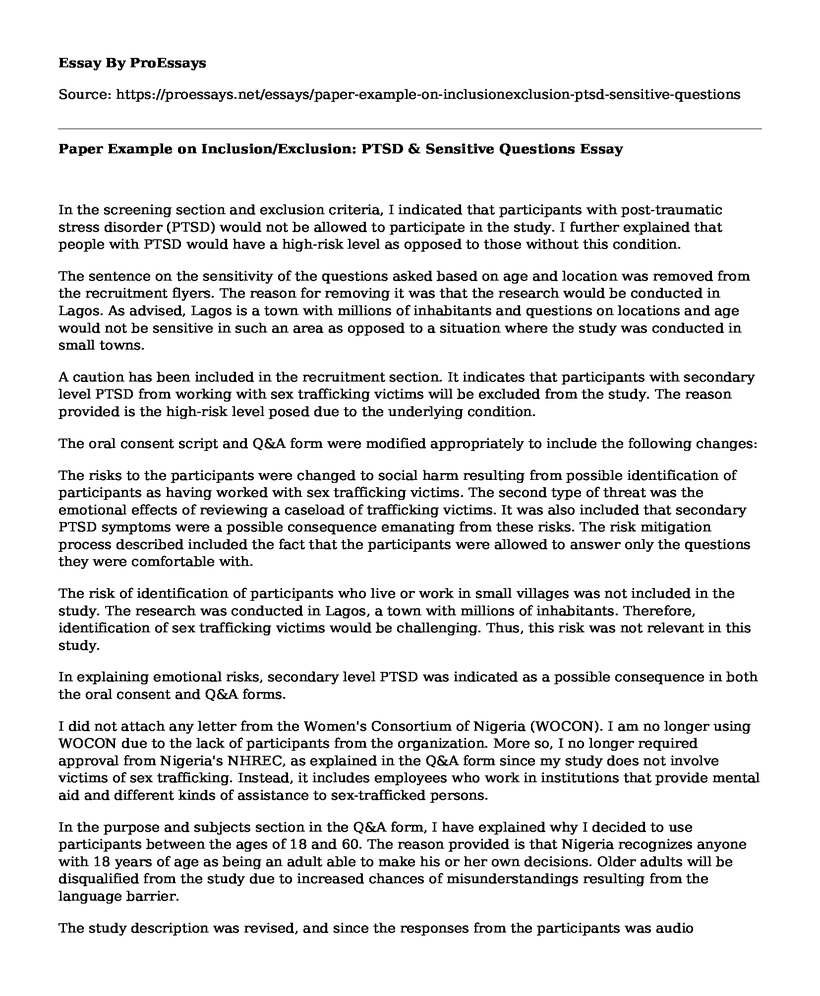In the screening section and exclusion criteria, I indicated that participants with post-traumatic stress disorder (PTSD) would not be allowed to participate in the study. I further explained that people with PTSD would have a high-risk level as opposed to those without this condition.
The sentence on the sensitivity of the questions asked based on age and location was removed from the recruitment flyers. The reason for removing it was that the research would be conducted in Lagos. As advised, Lagos is a town with millions of inhabitants and questions on locations and age would not be sensitive in such an area as opposed to a situation where the study was conducted in small towns.
A caution has been included in the recruitment section. It indicates that participants with secondary level PTSD from working with sex trafficking victims will be excluded from the study. The reason provided is the high-risk level posed due to the underlying condition.
The oral consent script and Q&A form were modified appropriately to include the following changes:
The risks to the participants were changed to social harm resulting from possible identification of participants as having worked with sex trafficking victims. The second type of threat was the emotional effects of reviewing a caseload of trafficking victims. It was also included that secondary PTSD symptoms were a possible consequence emanating from these risks. The risk mitigation process described included the fact that the participants were allowed to answer only the questions they were comfortable with.
The risk of identification of participants who live or work in small villages was not included in the study. The research was conducted in Lagos, a town with millions of inhabitants. Therefore, identification of sex trafficking victims would be challenging. Thus, this risk was not relevant in this study.
In explaining emotional risks, secondary level PTSD was indicated as a possible consequence in both the oral consent and Q&A forms.
I did not attach any letter from the Women's Consortium of Nigeria (WOCON). I am no longer using WOCON due to the lack of participants from the organization. More so, I no longer required approval from Nigeria's NHREC, as explained in the Q&A form since my study does not involve victims of sex trafficking. Instead, it includes employees who work in institutions that provide mental aid and different kinds of assistance to sex-trafficked persons.
In the purpose and subjects section in the Q&A form, I have explained why I decided to use participants between the ages of 18 and 60. The reason provided is that Nigeria recognizes anyone with 18 years of age as being an adult able to make his or her own decisions. Older adults will be disqualified from the study due to increased chances of misunderstandings resulting from the language barrier.
The study description was revised, and since the responses from the participants was audio recorded, the recordings will be transcribed then deleted. Mainly, this helps in minimizing the loss of confidentiality. I also indicated that the researchers would use the responses given in the demographic form, post-traumatic growth instrument, and quality of life instrument to deduce the relevant conclusions for the study. Also, when responding, participants should have a particular victim in mind and describe their situations, as indicated in the study description section.
In the risks of the research section, the process of minimizing the risks was revised. The included version indicates, "Although the surveys do not directly pertain to sex trafficking survivors, you may still experience a minimal amount of countertransference, emotional discomforts such as sadness, anger, or anxiety answering the questions. One of the measures that will be undertaken to minimize the risks mentioned above is to give the subjects an identification number and separate their names and real identity from the information they provide. Also, the researchers will clarify with the participants that they are not obliged to answering any questions that they may be uncomfortable with to ensure that they remain confident in the research process. Other resources will be provided to the participants to minimize their risks. The resources include consent forms, both oral and written. Also, audio recordings of the interviews will be transcribed and later deleted. Participants with Posttraumatic Stress Disorder will be excluded from the study since they could have high-risk levels. By understanding the terms of the forms, the participants will understand the conditions of the research. Thus, they will be at ease."
Conclusion
Lastly, the oral consent script was revised to correct the grammatical and spelling errors. The phrase, "what is required" was replaced with "what will be asked." The possible risks and minimization strategies were also included in the script. The oral consent script was revised from the use of the third person to second person reference. Compensation was excluded as a benefit and the name included at the end of the script.
Cite this page
Paper Example on Inclusion/Exclusion: PTSD & Sensitive Questions. (2023, Jan 29). Retrieved from https://proessays.net/essays/paper-example-on-inclusionexclusion-ptsd-sensitive-questions
If you are the original author of this essay and no longer wish to have it published on the ProEssays website, please click below to request its removal:
- How Grief Is Dealt with In Different Cultures
- Essay Sample on First-Time Crisis: A Journey of Saving a Life
- Birth Order Impacts Personality: Research Findings
- Essay Example on Sleep Disturbances in PTSD Victims of Sexual Abuse
- Essay Example on Busy Patrol Unit's Performance Wanes: Investigating the Impact of Partner Dynamics
- Essay Example on Socialization: The Key to Human Well-Being and Success
- Essay Example on The Good Life and the Pursuit for Happiness







